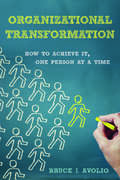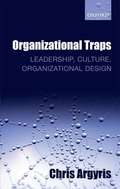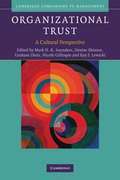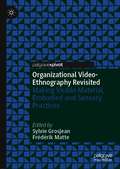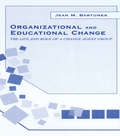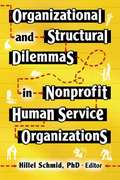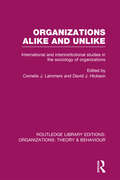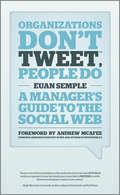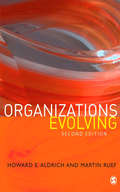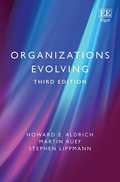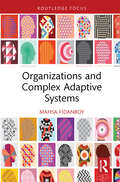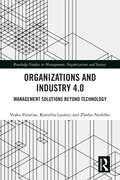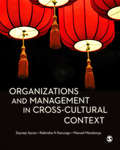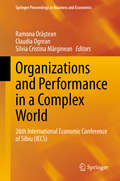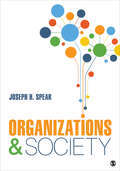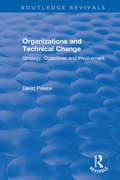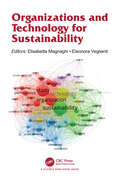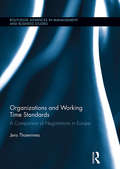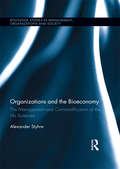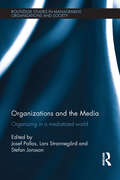- Table View
- List View
Organizational Transformation: How to Achieve It, One Person at a Time
by Bruce J. AvolioIt is estimated that approximately seventy percent of organizations fail in their attempts to implement transformative change. This book will help lessen that rate. Using real-world examples, Bruce J. Avolio maps four states of change that any organization must go through: identifying and recognizing, initiating, emerging and impending, and institutionalizing new ways of operating. Each state is described in detail, as are the leadership qualities necessary to solidify and transition from one to the next. These "in-between moments" are an often-overlooked key to organizational transformation. So too is the fact that organizational change happens one individual at a time. For transformation to take root, each person must shift his or her sense of self at work and the role that he or she plays in the transforming organization. Intended as a road map, rather than a "how-to" manual with fixed procedures, Organizational Transformation will help leaders to locate their organization's position on a continuum of progress and confidently navigate planned, whole-systems change, overcoming the challenges of growing from and adjusting to watershed moments.
Organizational Traps: Leadership, Culture, Organizational Design
by Chris ArgyrisThis book argues that whatever theory is used to describe and understand such organizational traps should be used to design and implement interventions that reduce and prevent them. Argyris is one of the world's leading management scholars whose work has consistently shed light on organizational problems. This book is essential reading for MBAs, managers, and consultants.
Organizational Traps: The Madness--and the Wisdom--of Crowds
by Richard LueckeGroups can sometimes take on characteristics and dynamics that impede individual decision making. Being aware of how susceptible you and your colleagues are to powerful social influences is important. This chapter examines several ways in which groupthink and other social influences can infect a logical decision process.
Organizational Trust: A Cultural Perspective
by Roy J. Lewicki Denise Skinner Graham Dietz Nicole Gillespie Mark N. K. SaundersThe globalized nature of modern organizations presents new and intimidating challenges for effective relationship building. Organizations and their employees are increasingly being asked to manage unfamiliar relationships with unfamiliar parties. These relationships not only involve working across different national cultures, but also dealing with different organizational cultures, different professional cultures and even different internal constituencies. Managing such differences demands trust. This book brings together research findings on organizational trust-building across cultures. Established trust scholars from around the world consider the development and maintenance of trust between, for example, management consultants and their clients, senior international managers from different nationalities, different internal organizational groupings during times of change, international joint ventures, and service suppliers and the local communities they serve. These studies, set in a wide variety of national settings, are an important resource for academics, students and practitioners who wish to know more about the nature of cross-cultural trust-building in organizations.
Organizational Video-Ethnography Revisited: Making Visible Material, Embodied and Sensory Practices
by Frédérik Matte Sylvie GrosjeanThis book explores the undeveloped potential of video-ethnography to study the material, embodied and sensory dimensions of workplace practices. With the growing interest in sociomateriality and the development of research on the embodied and sensory dimensions of organizational practices, some methodological challenges of this type of research need to be addressed. The main purpose of this book is to present various forms of video-ethnography that make organizational phenomena visible and help better appreciate the organizing properties of bodies, affects, senses and spaces in workplace practices. To do so, illustrative cases based on video-ethnography was discussed to understand how experiential and unspoken ways of knowing produced through a video-based approach can be made meaningful and relevant to study the material, embodied and sensory dimension of work practices. This book is addressed to researchers and students in social sciences and organizational studies and offers a methodological reflection on how to study the material, embodied, and sensory dimensions of organizational life.
Organizational and Educational Change: The Life and Role of A Change Agent Group (Organization and Management Series)
by Jean M. BartunekJean M. Bartunek, the 2001-2002 President of the Academy of Management, has written an excellent scholarly book on organizational and educational change. Using a joint insider/outsider approach, this book tells the story of a change agent group--a group of teachers--that was creating change in its organization setting, a Network of Independent Schools. The group's focus was on empowerment and professional development for teachers in the Network. The book describes virtually everything that happened in the group over its first seven years and summarizes what happened during its final two years. It explores the identity, work, and evolution of change agent groups in organizations, with particular emphasis on teachers and educational change. Through the book's extensive quotations and narrative account, the reader is enabled to enter into the world of the teacher group studied over the course of its nine-year history. In addition, the book includes analysis of the underlying processes involved in the change, focusing on the change agent group's identity, its actions and relationships with stakeholders as they jointly evolved over time, and their impacts on the vitality of the change effort. It contributes a new understanding of fundamental processes involved in organizational change, especially when viewed from the perspective of change agents. In addition, the book provides practical implications for change agents, specifically change agents in schools. As such, this account will be useful for graduate students and researchers in organizational change, educational leadership, and professional development. It is a part of Lawrence Erlbaum Associates growing series in organization management.
Organizational and Process Reengineering: Approaches for Health Care Transformation
by Jean Ann Larson FACHE FHIMSS DSHSWinner of the Healthcare Information and Management Systems Society‘s (HIMSS) 2015 Book of the Year AwardGiven the on-going changes and challenges faced by today‘s health care organizations, Organizational and Process Reengineering Approaches for Health Care Transformation provides a practical, leader-led and team-based approach for reengineering o
Organizational and Structural Dilemmas in Nonprofit Human Service Organizations
by Hillel SchmidImprove your organization&’s performance for the well-being of your clients! Organizational and Structural Dilemmas in Nonprofit Human Service Organizations explores the common pitfalls that plague nonprofit human service organizations and cause them to fail in their missions. In this book, leading scholars analyze and evaluate the inherent difficulties that impede effectiveness in these organizations. With this wide-ranging body of knowledge, research findings, and information, you will be able to identify key areas in your organization that may become troublesome at a later date and prevent them from deteriorating. This valuable tool also includes advice and suggestions for repairing detrimental situations that have already occurred or are taking place. The book supplies solutions for repairing or preventing any permanent damage to your organization&’s structure, value, or reputation. Organizational and Structural Dilemmas in Nonprofit Human Service Organizations will help you set successful long-term strategies for your organization, despite changes in laws, programs, and public sentiment. With this book, you will learn more about: the changing identity of federated community service organizations the role of congregations as social service providers volunteer and paid staff relations the implications of welfare-to-work programs the cycles of public sentiment as expressed through the media the issue of nonprofit executive misbehavior the preferences of social work graduates for employment in various sectors of the welfare economy such as for-profit as opposed to nonprofit the differences between for-profit and nonprofit organizations
Organizations Alike and Unlike: International and Inter-Institutional Studies in the Sociology of Organizations (Routledge Library Editions: Organizations)
by David J. Hickson Cornelis J. LammersThis volume contrasts the life and problems of organizations in many parts of the world and highlights the differences between those societies as reflected in their different institutional sectors such as manufacturing, commerce, social services and government administration. In so doing, the book contributes to the theoretical foundations of the sociology of organizations by revealing previously unseen relationships between societies and institutions, offering an original synthesis of available research.
Organizations Don't Tweet, People Do
by Andrew Mcafee Euan SemplePractical advice for managers on how the Web and social media can help them to do their jobs betterToday's managers are faced with an increasing use of the Web and social platforms by their staff, their customers, and their competitors, but most aren't sure quite what to do about it or how it all relates to them. Organizations Don't Tweet, People Do provides managers in all sorts of organizations, from governments to multinationals, with practical advice, insight and inspiration on how the Web and social tools can help them to do their jobs better. From strategy to corporate communication, team building to customer relations, this uniquely people-centric guide to social media in the workplace offers managers, at all levels, valuable insights into the networked world as it applies to their challenges as managers, and it outlines practical things they can do to make social media integral to the tone and tenor of their departments or organizational cultures.A long-overdue guide to social media that talks directly to people in the real world in which they workGrounded in the author's unparalleled experience consulting on social media, it features eye-opening accounts from some of the world's most successful and powerful organizationsGives managers at all levels and in every type of organization the context and the confidence to make better decisions about the social web and its impact on them
Organizations Evolving
by Martin Ruef Howard AldrichA keenly anticipated Second Edition of an award winning classic, Organizations Evolving presents a sophisticated evolutionary view of key organizational paradigms that will give readers a unified understanding of modern organizations. <p><p> This Second Edition is an up-to-date survey of the literature, as well as an overview of the new developments across organization studies. It contains new sections on organizational forms, community evolution and methods for studying organizations at multiple levels. <p> The field of organization studies contains many contending paradigms that often puzzle and perplex students. This book is a stunning synthesis of the major organizational paradigms under the umbrella of organizational theory. Scholars and students will find it an excellent guide to the strengths and weaknesses of the various approaches, as well as an outstanding review of the best recent empirical research on organizations. <p> The book includes many helpful features, such as: <p> - Review questions and exercises that will consolidate reader's learning <p> - A methodological appendix that assesses common research methods <p> - Engaging cases that bring principles and concepts to life <p> This Second Edition is a rich resource for study, discussion and debate amongst organizational scholars and postgraduate students of organizations.
Organizations Evolving
by Martin Ruef Howard E. Aldrich Stephen LippmannOrganizations Evolving offers a unique theoretical framework for understanding organizational emergence, persistence, change, and decline. Synthesizing and integrating six paradigmatic approaches to organization theory, this updated and revised third edition presents an evolutionary view that provides a unified understanding of modern organizations and organization theory. Key features of the third edition include: • A sophisticated analytic comparison of six major approaches to understanding modern organizations and their evolution • An interdisciplinary focus, drawing extensively from sociology, social psychology, economics, history, management, and entrepreneurship research • Supplementary materials from academic journals and the popular press, and multi-media resources in an online companion • Extensive case examples that illustrate key evolutionary processes • Study questions designed for extended and reflective learning. Offering key insights and critical learning opportunities, this book is crucial reading for classes covering macro-organizational behavior and the sociology of organizations. Students of management studies and entrepreneurship, particularly those with a focus on organization theory, will also benefit from its interdisciplinary approach.
Organizations and Complex Adaptive Systems (Routledge Focus on Business and Management)
by Mahsa FidanboyOrganizations and Complex Adaptive Systems explains complexity theory within the organizational studies and discusses the applicability of complex adaptive systems principles for intraorganizational and interorganizational levels. Complex adaptive systems and complexity theory have been studied in many different fields of science. When studying the application of complex adaptive systems within social sciences, not many are seen in real terms in contrary to the myriads of theories and propositions available. The complex adaptive systems perspective is presented in quantitative terms in natural sciences, but a quantitative approach has not been used within social sciences a lot comparatively. This book links the basics of complex adaptive systems to social sciences, focusing on organizational studies and covering interorganizational, organizational, and individual levels. It shows the latest state of knowledge on the topic and will be of interest to researchers, academics, managers, and students in the fields of management, organizational theory and behavior, and strategic management.
Organizations and Industry 4.0: Management Solutions Beyond Technology (Routledge Studies in Management, Organizations and Society)
by Zlatko Nedelko Vojko Potočan Kornélia LazányiKnown models for assessing the readiness and level of Industry 4.0 implementation are helpful in revealing key technological and non-technological aspects relevant in the frame of Industry 4.0 implementation in organizations. At the forefront are technological aspects of Industry 4.0 implementation in organizations, while non-technological aspects play a marginal role. Building upon ample evidence about the role of non-technological aspects of Industry 4.0 implementation in organizations, this book addresses these ever-important non-technological aspects.The authors address the role of management solutions in the framework of Industry 4.0 implementation through the utilization of various management tools, which support organizations working in all organizational areas. The importance of humans for Industry 4.0 is currently severely neglected, despite the many changes in the workplace. Thus, new challenges for human resource management (HRM) have emerged, such as technostress, human–robot interaction (HRI), and new tasks for employees. Non-technological aspects of Industry 4.0 are broadly influencing entire organizations, as the management tools support the working of organizations in all areas. Focusing on non-technological aspects of Industry 4.0 implementation, this book considers the utilization of traditional management tools as a key vehicle for supporting implementation in organizations. In terms of the importance of humans for implementation, at the forefront are changes in the workplace due to Industry 4.0, HRIs, and changing HRM practices.This book will be of value to researchers, academics, and advanced students in the fields of organizational studies, HRM, and change management.
Organizations and Management in Cross-Cultural Context
by Rabindra N. Kanungo Manuel Mendonca Zeynep Aycan*Shortlisted for the CMI Management Book of the Year Award 2014 in the textbook category*<P><P> An ideal course text for Organizational Behaviour, Human Resource Management or Cross-Cultural Management courses. <P> * Chapters present the fundamental theoretical approaches in all key areas including leadership, ethics and change, and then explore them in the context of culture and cross-cultural management. <P> * Encourages self-reflection and critical appraisal through a series of questions and scenarios designed to get you thinking like a manager working with an international team. <P> * Provides practical guidance on tackling the most complex issues facing managers today. <P> * Contains insights into the experiences of real employees working in a multicultural environment. <P> The companion website www.sagepub.co.uk/kanungo provides a wealth of additional material to support students and teachers alike.
Organizations and Performance in a Complex World: 26th International Economic Conference of Sibiu (IECS) (Springer Proceedings in Business and Economics)
by Silvia Cristina Mărginean Claudia Ogrean Ramona OrășteanThis volume highlights current research and developments on organizations and (their) performance against the background of ubiquitous complexity. It investigates some of the challenges and trends dominating the complex world of nowadays and the ways organizations are dealing with them in their continuous search for performance. The papers in the volume cover a series of hot and/or emerging topics (i.e. sustainable development, corporate social responsibility, green marketing, digital revolution, social media, global trade, intangible assets, economic intelligence and innovation).Built on an interdisciplinary perspective and a multi-level approach―global (trade, power, sustainable development), regional (EU, BRICS), national (country-based systems, cultures, policies, practices), industry (airlines, pharma, luxury, retailing, banking, tourism), local (communities, destinations), and organization (entrepreneurship, MNEs, public organizations: national and local)―the volume uniquely addresses issues of high interest for researchers, practitioners and policymakers.
Organizations and Society
by Joseph H. SpearWhat are the costs and consequences of living in a society that has undergone an "organizational revolution"? To what extent is social life in the 21st century dominated by the rational control that is characteristic of bureaucratic organizations large and small? Organizations and Society addresses these broader human questions with a critical perspective, while at the same time explaining the main concepts and theories in the field. Students of all interests—those who wish to run organizations someday, study them, or simply understand their importance in the contemporary social order—will benefit from the insights and cogent arguments of this text for undergraduate classrooms.
Organizations and Society
by Joseph H. SpearWhat are the costs and consequences of living in a society that has undergone an "organizational revolution"? To what extent is social life in the 21st century dominated by the rational control that is characteristic of bureaucratic organizations large and small? Organizations and Society addresses these broader human questions with a critical perspective, while at the same time explaining the main concepts and theories in the field. Students of all interests—those who wish to run organizations someday, study them, or simply understand their importance in the contemporary social order—will benefit from the insights and cogent arguments of this text for undergraduate classrooms.
Organizations and Technical Change: Strategy, Objectives and Involvement (Routledge Revivals)
by David PreeceFirst published in 1995, Organizations and Technical Change examines the key changes that have taken place in the external and internal contexts of organizations which have experienced technical change. It reviews and assesses major elements of new technology, including: the development of strategy; the setting of objectives; employee involvement; and the management of the adoption process. Through four case studies, the book considers in detail a variety of approaches and shows how the adoption of technology and the issues involved have changed since the 1980s.
Organizations and Technology for Sustainability
by Elisabetta Magnaghi Eleonora VegliantiThis book presents insights on digital transformation with a multidisciplinary lens. Collecting chapters from several management perspectives, it provides perspectives on the role of various concepts and elements that are needed by our organizations to win in today’s competition. This book is a contribution to the organizational, to the information and communication technology (ICT) as well as to the sustainability discussion. Here, the readers can find heterogenous inputs to better understand the organizational and technological aspects considering a sustainable business approach. This book is for academicians, students and practitioners interested in the interplay among IT-based solutions, organizational entities and sustainability issues.
Organizations and Unusual Routines
by Ronald E. Rice Stephen D. CooperEveryone working in organizations will, from time to time, experience frustrations and problems when trying to accomplish tasks that are a required part of their role. In such cases it is normal for people to find ways of completing their work in such a way that they can get around, or just simply avoid, the procedure or system that has caused the problem. This is an unusual routine - a recurrent interaction pattern in which someone encounters a problem when trying to accomplish normal activities by following standard organizational procedures and then becomes enmeshed in wasteful and even harmful subroutines while trying to resolve the initial problem. Using a wide range of case studies and interdisciplinary research, this book gives researchers and practitioners invaluable information on the nature of this pervasive organizational phenomenon and shows how they can be dealt with in order to improve organizational performance.
Organizations and Working Time Standards: A Comparison of Negotiations in Europe (Routledge Advances in Management and Business Studies #54)
by Jens ThoemmesCollective bargaining between employers and trade unions has profoundly changed working conditions in companies around the globe. But why do we start work at the age of 10, 16, 18 or 24? Why do we work 6, 8, 10 or more hours a day? These questions are becoming increasingly pertinent as working norms are fractured and fragmented by country. This book brings an entirely new perspective to our understanding of changes in working time. In both the UK and the US, effective legal or collectively-bargained regulation of working time has been limited over the last 20 years, to the extent that its disappearance is seen as almost unproblematic. Here author Jens Thoemmes sheds light on this transition and its economic implications with a fully evidenced sociological account, based particularly on original research into cases of working time standards in France and Germany. This book addresses the whole process of working time regulation over the last twenty years, evaluating the activities of trade unions, employers, and the State. While theories of industrial relations have already addressed the issue of markets in the context of collective bargaining, this book draws connections between time and markets, places these transitions in their historical contexts, and illustrates the importance of this movement crossing borders and cultures.
Organizations and the Bioeconomy: The Management and Commodification of the Life Sciences (Routledge Studies in Management, Organizations and Society)
by Alexander StyhreThe advancement of the life sciences and the technosciences has enhanced the longevity of citizens in the Western world, and half of the generation born in the first decade of the new millennium is now expected to live to the age of one hundred years. In a society with such longevity and affluence, consumption of health-related goods and services such as pharmaceuticals and scanning procedures may be seen as a sustainable source of income for the industries that promote it. Though the healthcare sector has traditionally been organized in the public sector in Europe and in the private sector in the US, the recent advancement of new therapies and direct-to-consumer marketing have opened up new streams of consumption and revenue for health care goods and services around the globe. This book examines the so-called ‘bioeconomy’ as a new economic and commercial field that emphasizes the management of individual life, including the regulation and control of weight and food consumption and other issues pertaining to individual well-being. In addition, the bioeconomy includes a variety of practices based on commercial interests such as organ donations, reproductive medicine and technologies, and what has been referred to as the tissue economy – the various forms of trade with human tissues. Author Alexander Styhre provides a thorough introduction to the bioeconomy, exploring this new and unique intersection of the life sciences and the technosciences with more traditional consumer markets.
Organizations and the Media: Organizing in a Mediatized World (Routledge Studies in Management, Organizations and Society)
by Stefan Jonsson Josef Pallas Lars StrannegårdThe relationship between media and the organizations they cover has changed dramatically in the last few decades, which have witnessed a huge expansion of news coverage focusing on different types of organizations and their activities. In parallel, organizations have dramatically increased their investment in public relations and other media-oriented forms of communication. Like other societal developments – globalization, marketization, individualization, scientification – mediatization has become an institutional force. This book analyses the mediatization of contemporary organizations and how individual organizations, industry or markets are scrutinized. It examines its key influence on the actions of organizations, and how it shaptes the entire landscape in which the organizations operate. What such a perspective provides is the accentuation of the interplay between organizations and different parts of the society as embedded in the media and its logic. This will be essential reading for professionals, academics and advanced students in organizational studies, public relations and media studies.
Organizations and the Natural Environment: Innovations in Sustainability
by Alfred A. MarcusTo what extent can competition between companies encourage innovations in sustainability that have the potential to solve some of the world's major challenges? Using a series of case studies, this book pits closely related competitors against each other to examine the progress in and obstacles to the evolution of sustainable innovations in energy efficiency, solar power, electric vehicles and hybrids, wind energy, healthy eating, and agricultural productivity. It delves into the efforts of Tesla Motors to bring about a revolution in personal transportation, and the challenges Toyota and General Motors (GM) confront in commercializing hybrids. It explores the movement to healthy food by cereal companies General Mills and Kellogg's, and depicts the battles between Whole Foods and Walmart for the world's palate. By examining the experiences that particular businesses have had with sustainable innovation, this insightful book reflects upon lessons learned and encourages readers to think carefully about the challenges that lie ahead.
